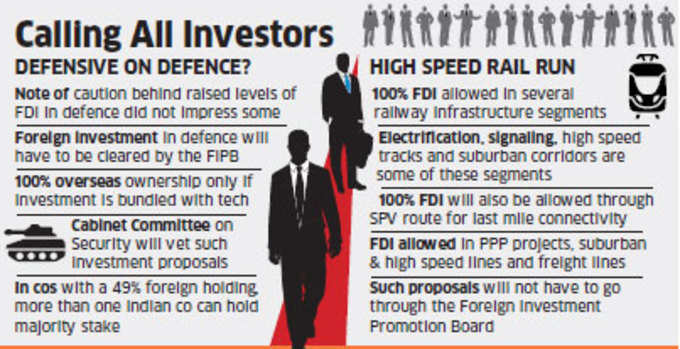100 per cent foreign investment in railway infrastructure projects will be allowed while in the case of defence the limit has been raised to 49 per cent from the current 26 per cent, subject to the Indian owners exercising management control.
The
"It is a composite cap, incorporating all forms of foreign investment, FDI, FII, FPI, NRI, etc," said a
"Good development, but not great. Round one has gone to protectionist forces. 49 per cent is the same as 26 per cent technically and hence may not open the investment floodgates," said Amber Dubey, Partner and India Head of Aerospace and Defense at global consultancy KPMG.
"We hope better judgment prevails and we have the FDI limit enhanced to 74 per cent later this year," he added. Official notifications giving effect to changes will be issued soon, after the minutes of the cabinet meeting are finalised.

Foreign investment in defence will be though the approval route, implying it will have to be cleared by the Foreign Investment Promotion Board (FIPB). Though the 49 per cent cap will be general rule for the defence sector, 100 per cent overseas ownership will be allowed in case the
In companies with a 49 per cent foreign holding, more than one Indian company will be allowed to hold the 51 per cent share, unlike the present norm that mandates that a single Indian entity should own and control the entire 51 per cent, a move that will encourage more domestic players to enter the sector.
In case of Railways, 100 per cent FDI will now be allowed in railway infrastructure segments such as electrification, signalling, high speed and suburban corridors. 100 per cent FDI will also be allowed through the Special Purpose Vehicle route to provide last mile connectivity to ports and mines. Further, some railway operations have also been partially opened up to foreign investment.
FDI is now allowed in PPP projects, suburban corridors, high speed train systems, and dedicated freight lines. Estimates suggest that the opening of railways to foreign
As a result of these changes, railways transport will be removed from the list of prohibited sectors in the consolidated FDI policy.